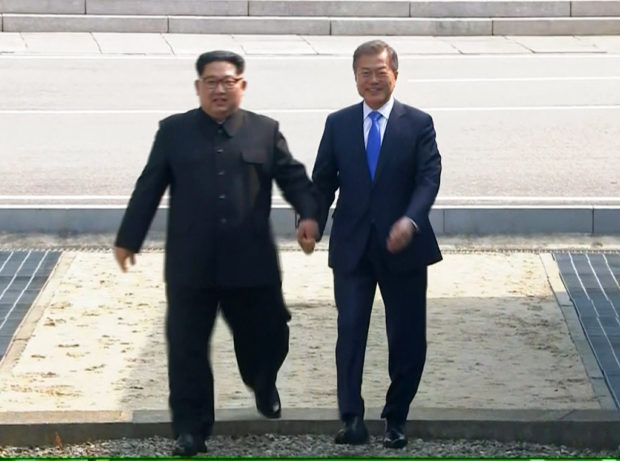Denuclearization the real test of talks: World leaders

In this image taken from video provided by Korea Broadcasting System Friday, April 27, 2018, North Korean leader Kim Jong Un, left, crosses the border into South Korea, along with South Korean President Moon Jae-in for their historic face-to-face talks, in Panmunjom. Their discussions will be expected to focus on whether the North can be persuaded to give up its nuclear bombs.(Korea Broadcasting System via AP)
SEOUL—World leaders welcomed the historic meeting between the two Koreas yesterday but spelt out that denuclearization must be the end goal of this landmark summit that has taken 65 years to materialize.
Japanese Prime Minister Shinzo Abe was most unequivocal on this position. “What’s important is that this leads to complete, verifiable denuclearization,” he told reporters yesterday. “I want to emphasize this.” Japan has been a constant target of North Korea’s ballistic and nuclear missiles.
Even as South Korean President Moon Jae In and North Korean leader Kim Jong Un drummed up the success of the summit, their counterparts around the world showed less enthusiasm.
United States President Donald Trump, who is slated to hold a high-stakes meeting with Mr. Kim by early June, said yesterday in a tweet: “After a furious year of missile launches and nuclear testing, a historic meeting between North and South Korea is now taking place. Good things are happening, but only time will tell!”
He later tweeted again, tipping his hat to Chinese President Xi Jinping, whom Mr. Kim had secretly visited on his first official overseas outing last month.
Article continues after this advertisement“Please do not forget the great help that my good friend, President Xi of China, has given to the United States, particularly at the border of North Korea. Without him it would have been a much longer, tougher process!”
Article continues after this advertisementChina has been the North’s main ally for years, although it has increasingly been standing on the side of United Nations sanctions against Mr. Kim’s regime over his missile tests, which have hit the reclusive nation hard.
Hugs, laughter, banter mark historic meet
Holding each other’s hand tightly in a farewell ceremony, Moon and Kim watched a video montage set against the facade of the Peace House, and played to the South’s 2015 unification campaign song One Dream One Korea.
The lyrics — “For the day we become one, for our heart-beating dream, I want you, let us hold our hands, you and I, one dream for one Korea” — epitomized an emotional, historic day for both leaders, with hopes raised for a rapprochement on the divided Korean peninsula.
The two Koreas are separated by the heavily fortified demilitarized zone (DMZ), a 4-km-wide strip stretching 248-km from coast to coast, 65 years after the Korean War was ended with a truce instead of a peace treaty. The Peace House, on the South Korean side of the Military Demarcation Line that serves as a de facto border, is in the truce village of Panmunjom.
The farewell ceremony followed a dinner attended by Mr. Kim’s wife Ri Sol Ju and Mr. Moon’s wife Kim Jung Sook, who shared a hug last night before the North’s delegation returned to Pyongyang. So, too, did Mr. Moon and Mr. Kim, after they signed a joint declaration vowing to put an end to the decades-long war.
China “hopes all relevant sides can maintain the momentum for dialogue and work together to promote the denuclearization of the peninsula and the process for the political settlement of the peninsula issue,” its Foreign Ministry said in a statement, adding that it was “willing to continue playing a proactive role in this regard.”
Foreign Ministry spokesman Hua Chunying said at a regular press briefing yesterday: “China sincerely hopes that this historic meeting can achieve positive results. There is a poem in China that says, ‘We remain brothers after all the vicissitudes, a smile is all that is needed to obliterate any enmity.'”
Foreign ministers from the Association of Southeast Asian Nations (Asean), who were gathered in Singapore for the Asean Summit, also sounded a similar note.
In a statement, they said: “The ministers are encouraged by these positive developments and urge all concerned parties to work towards reducing tensions, and the complete, verifiable and irreversible denuclearization of the Korean peninsula which will contribute to the peace and stability of the region.”
North Atlantic Treaty Organisation (Nato) chief Jens Stoltenberg called the meeting a “first step” and “encouraging,” but cautioned that “there is still a lot of hard work that lies ahead of us.”
Likewise, Britain, Australia and the European Union were wary, saying that the world needed to see evidence that Mr. Kim was putting down his nuclear arms for good.
“I welcome the announcement that the two Koreas will work towards the complete, verifiable and irreversible denuclearization of North Korea, improve bilateral ties and reduce border tensions,” said British Foreign Minister Boris Johnson in a statement.
“This historic summit is not the end in itself… The United Kingdom will continue to work with our international partners to strictly enforce existing sanctions until such time that North Korea turns its commitments into concrete steps towards denuclearization.” /jpv